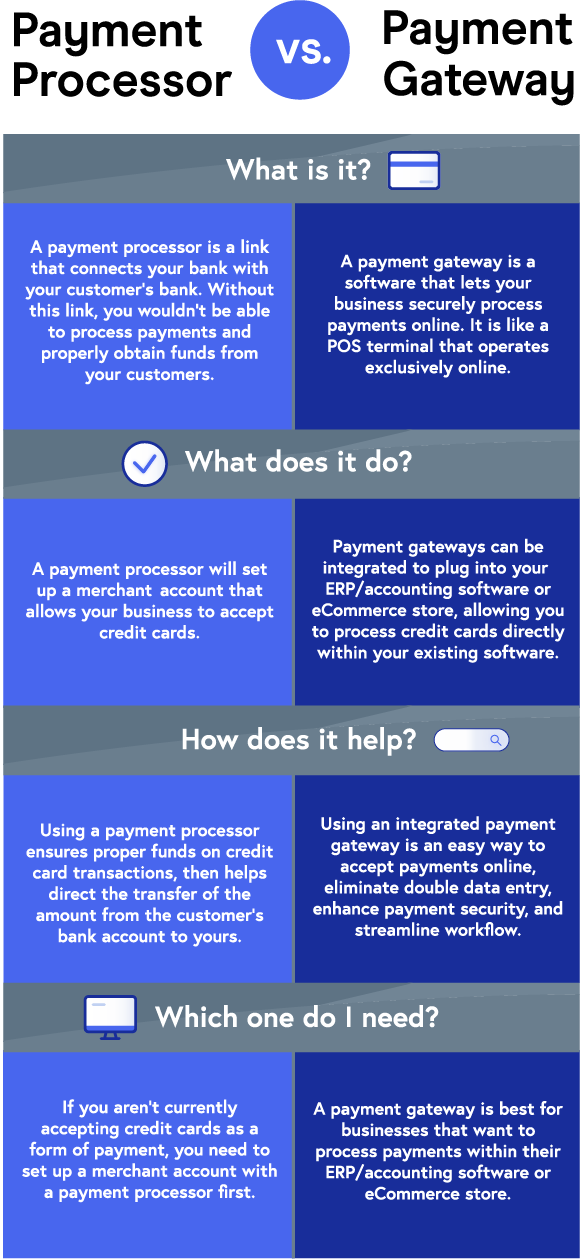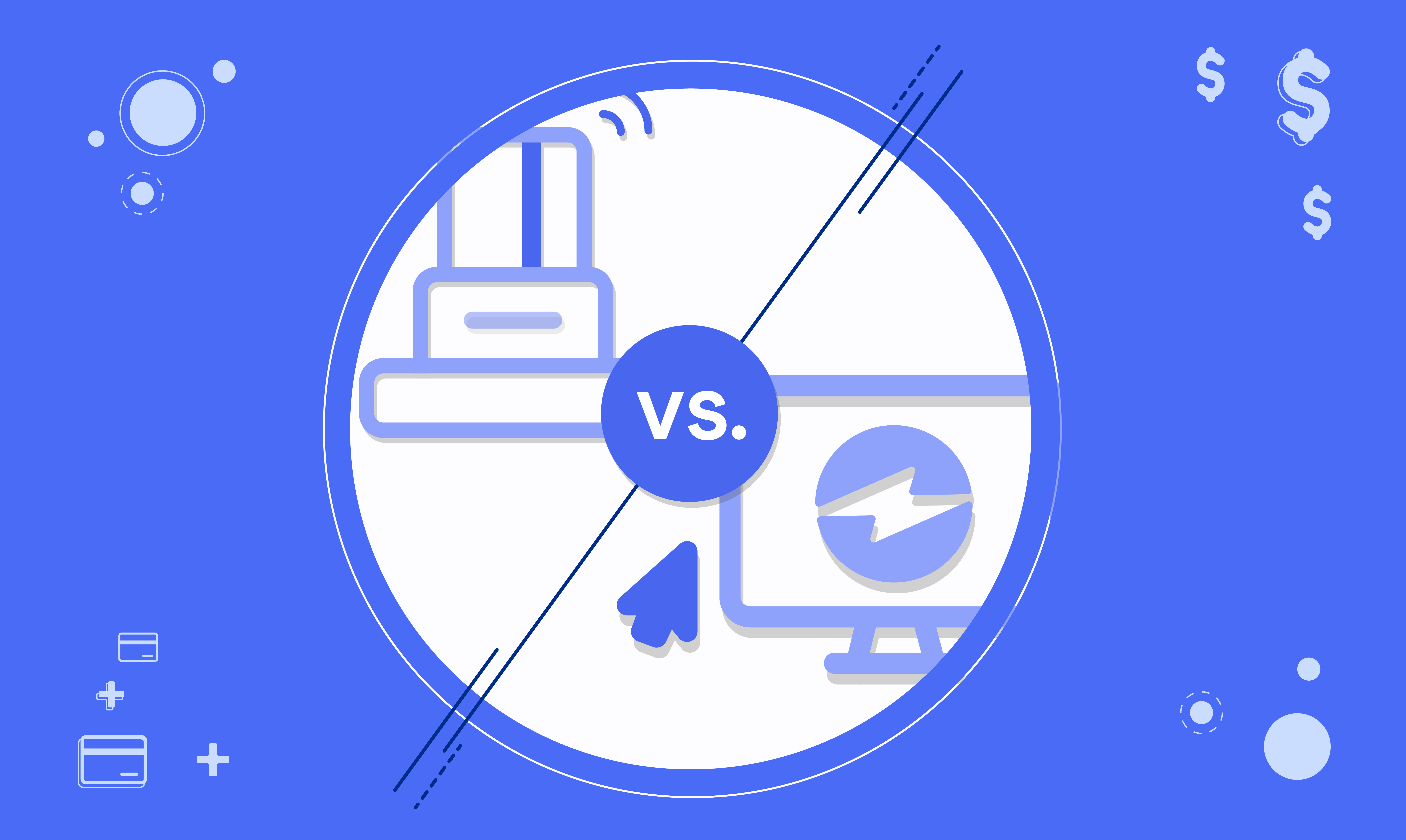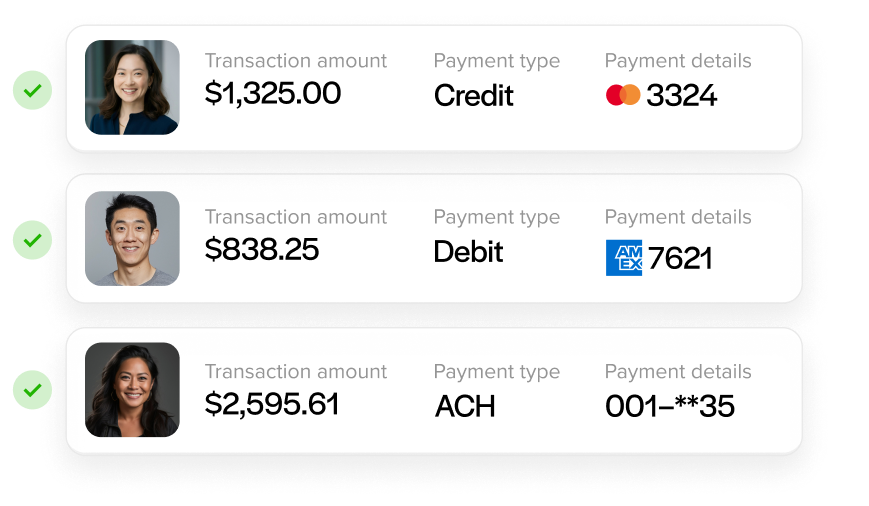Blog > Payment Processor vs. Payment Gateway: What’s the Difference?
Payment Processor vs. Payment Gateway: What’s the Difference?
As a small business owner, you may have heard the terms payment processor and payment gateway before. While they both play an important role in payment processing, do you understand the difference between them?
To fully comprehend the differences between payment processing and a payment gateway, you will need to learn about all of the key players involved, their functionality, and how they all interact with each other.
First, we need to understand the key components of payment processing. Here are the main players of each credit card transaction:
 The customer: The person whose card is swiped or keyed in.
The customer: The person whose card is swiped or keyed in. The merchant: The business that ends up with the money in exchange for the goods or services provided to the customer.
The merchant: The business that ends up with the money in exchange for the goods or services provided to the customer. The ERP/accounting software: The resource a business uses to record and report financial transactions.
The ERP/accounting software: The resource a business uses to record and report financial transactions. The card issuing bank: The bank that issued the customer’s credit card. For example, a customer who has a Visa may have it issued from one of many local or national banks such as Chase or Wells Fargo.
The card issuing bank: The bank that issued the customer’s credit card. For example, a customer who has a Visa may have it issued from one of many local or national banks such as Chase or Wells Fargo. The credit card network: The place where everything comes together for credit card processing and collection of fees, such as First Data.
The credit card network: The place where everything comes together for credit card processing and collection of fees, such as First Data. The merchant’s acquiring bank: The bank that issued the merchant account, where the merchant can withdraw funds.
The merchant’s acquiring bank: The bank that issued the merchant account, where the merchant can withdraw funds.
Payment processors and payment gateways are both an essential part of this process, although they each have their own unique roles.
What is a Payment Processor?
As a small business owner, you probably know how to process credit cards. Your customer makes a purchase, and funds are eventually transferred to your bank account. However, there are many steps that happen in between that allow you to receive your funds.
This is where a payment processor comes in.
A payment processor will set up a merchant account that allows your business to accept credit cards.
First, a payment processor takes the credit card information you entered and sends it to the credit card network, which checks with your customer’s bank to make sure they have the proper funds. The payment processor then passes along the approval from the network back to you.
Next, the payment processor tells the credit card network to go back and collect the amount of each transaction from the bank of each customer.
Finally, the money is removed from the customer’s account and deposited into your account.
Essentially, a payment processor is a link that connects your bank with your customer’s bank. Without this link, you wouldn’t be able to process payments and properly obtain funds from your customers.
What is a Payment Gateway?
When you sign up with a payment processor, you will receive a merchant account. Some processors will also offer a payment gateway.
A payment gateway is software that allows your business to securely process payments online. It’s like a POS terminal that operates exclusively online.
Payment gateways can be integrated to plug into your ERP/accounting software or eCommerce store, allowing you to process credit cards directly within your existing software.
A payment gateway is frequently used by businesses that accept orders over the phone or online. A good gateway will allow you to view unlimited transactions and batch history to make reporting easier for your business.
Using an integrated payment gateway is an easy way to accept payments online, eliminate double data entry, enhance payment security, and streamline workflow.
Click here to download our ultimate payment gateway checklist.
Payment Processor vs. Payment Gateway: Which One Do I Need?
A payment gateway is best for businesses that want to process payments within their ERP/accounting software or eCommerce store. If you don’t use accounting software or have an online store, a basic merchant account may be best.
When looking for a merchant account, make sure to find a processor that offers flat-rate or interchange plus pricing options, no contracts, PCI compliance, next-day funding options, chargeback management, and 24/7 in-house customer support.
If you want to streamline your payment acceptance and process credit cards online, a payment gateway would probably be best.
When looking for a payment gateway, make sure to find a processor that offers its own proprietary payment gateway. The gateway should be developed by in-house software developers and store customer card information off-site to ensure PCI compliance for small businesses.
Now that you know the difference between payment processor vs. payment gateway, you can hopefully find the best solution for your unique business needs.


